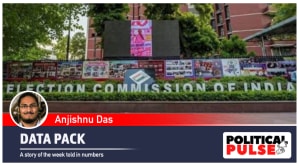Telecom’s above board, PM tells President
NEW DELHI, JULY 19: Prime Minister Atal Behari Vajpayee sent a reply to President K R Narayanan today, defending his government's decisio...

NEW DELHI, JULY 19: Prime Minister Atal Behari Vajpayee sent a reply to President K R Narayanan today, defending his government’s decision to bail out telecom firms, pointing out that last fortnight’s decision was merely an extension of the New Telecom Policy (NTP) which was cleared by his government as early as March this year. That is, several weeks before his government lost the vote of confidence in Parliament.
This is in response to the President’s suggestion that the new package be held back till a new government was in place. The President had also summoned former Communications Minister Jagmohan last week to get more details about the package.
Jagmohan was seen as opposed to the package when he was minister, and the President wanted to know what his objections were at that time, and if these had been satisfactorily answered in the new package. The President also met Finance Minister Yashwant Sinha last week, though it is not clear whether he spoke to Sinha on why his ministry had opposed the package in the crucial Cabinet meeting. Sinha had gone to meet the President about the proposed Kargil tax.
The NTP, Vajpayee’s letter to Narayanan says, had clearly said that existing telecom players would be allowed to migrate from their existing fixed license fee structure to a less onerous revenue-sharing one. Since the March policy okayed this, the July 7 Cabinet meet just formalised the mechanics of how this migration should take place. The NTP had also suggested that a revenue-sharing approach be taken to all new telecom circles, where no licenses had been issued so far.
The Prime Minister’s reply also encloses various letters written by Pranab Mukherjee of the Congress(I), Chandrababu Naidu of the TDP and Somnath Chatterjee of the CPI — all had sent letters to the Prime Minister endorsing the principle of revenue sharing, though their letters had reached Vajpayee before the actual Cabinet decision last fortnight.
The government also received thousands of congratulatory letters on the New Telecom Policy, and Vajpayee has referred to these in his letter to the President.
While the original telecom policy of 1994 had gone in for fixed license fees, private operators who had bid to pay very high fees later complained that they could not pay such fees as the business did not warrant this. Jagmohan then asked operators to pay up at least 20 per cent of their outstandings, and also cancelled the licenses of three operators.
Following a fresh effort to resolve matters by the Prime Minister’s Office (PMO), the Attorney General was called back from a trip abroad and asked to give a fresh opinion on whether or not the existing license-holders could be allowed to migrate to the lower revenue-share-based license fees. Last month, the AG opined that this was possible, but asked operators to pay up all existing dues by December 31, and at least 15 per cent by August 15.
Apart from saying that a shift to revenue-share was possible, the AG also increased the life of licenses from 10 years to 20 years.
The Attorney General justified this view, which was different from one given by him in May, by pointing out that if the telecom companies were not bailed out, it would have an adverse impact on banks and financial institutions which had lent them large sums of money.
The AG also pointed out that the relief to operators should be viewed and appreciated in the context of the larger public interest in the revival and growth of the telecom industry.
Apart from details of the AG’s opinion, Vajpayee’s letter says the telecom package was widely discussed in the media as well as with opposition leaders before a final decision was taken.




- 01
- 02
- 03
- 04
- 05

























